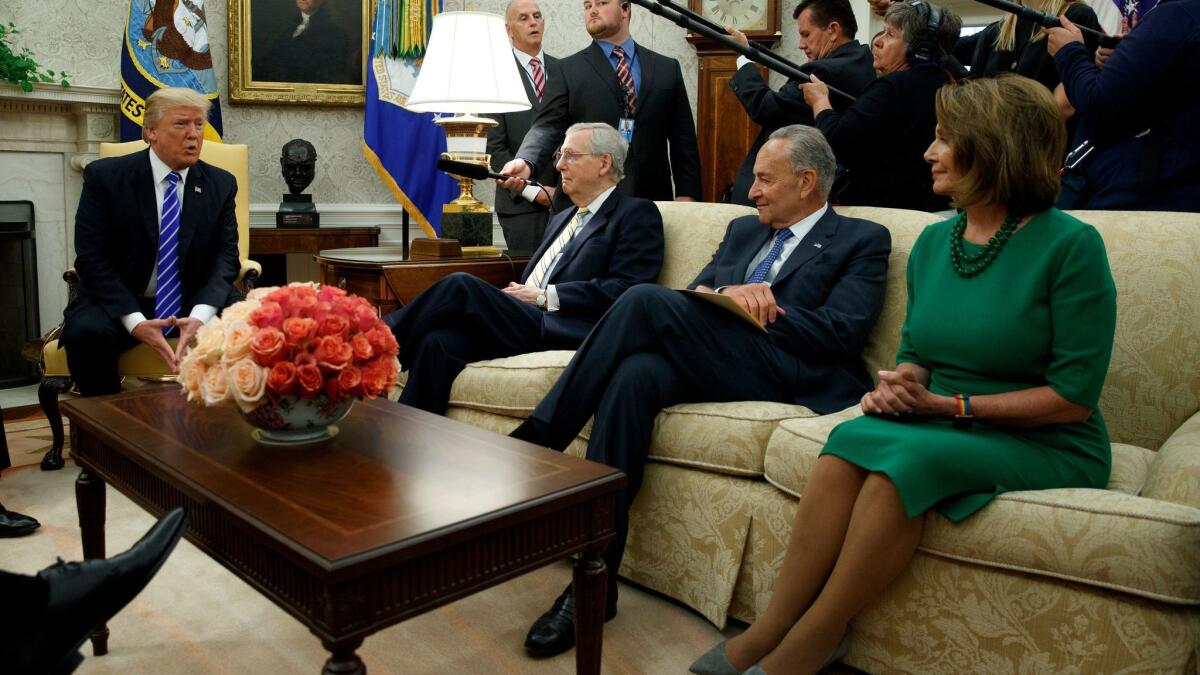Opinion: Trump’s three-for-one deal to avert a shutdown and a default is welcome, if imperfect

The deal President Trump reportedly struck with top congressional Democrats to keep the government going temporarily, avoid a default and provide relief for hurricane victims will no doubt give die-hard fiscal conservatives a pounding headache. But it’s a concession to a painful reality: Congress can’t seem to master the basics of governing.
First, kudos to Trump for telling reporters on Air Force One on Wednesday, “Always we’ll agree on debt ceiling automatically because of the importance of it.” That’s the most straightforward part of the agreement, and the only drawback is that the ceiling wasn’t raised for a considerably longer period.
Lawmakers have a debate every year or two over the debt ceiling because they refuse to use the tools at their disposal — including the annual budget resolution, budget reconciliation bills and the annual appropriations process — to stop the rising tide of debt by bringing the federal budget into balance. That’s a choice they’ve made, and we can debate whether it was a good one. But once they’ve made that choice, it’s just posturing and hypocrisy to balk when it comes time to increase the debt limit.
Republicans who embraced that budget can’t honestly oppose raising the debt ceiling now.
(That posturing and hypocrisy has a rich bipartisan history. Federal budget guru Stan Collender of Qorvis observed that lawmakers from the party that doesn’t occupy the White House are usually the ones opposing any increase in the debt ceiling. That’s not true this go-around, as Republicans in Congress are the ones threatening to make a Republican administration default. It’s as if GOP lawmakers were declaring, “Stop me before I kill myself,” Collender said.)
Remember, the debt ceiling doesn’t really prevent the government from spending more than it collects in taxes — it blocks the feds from financing the debts and obligations that Congress has already incurred. Given that Washington is spending about 20% more than it’s taking in, failing to raise the debt limit would cause the Treasury to start stiffing a significant portion of its creditors (potentially including Social Security recipients and veterans). And despite claims to the contrary by some deficit hawks, credit rating agencies and bondholders would punish the United States if it missed any of those payments, even if it stayed current on its debt service.
Which brings us to part two of the deal, which is a three-month continuing resolution. Such bills are the white flags of fiscal policy, keeping the previous year’s priorities and spending levels in place while Congress tries to work out a new set of instructions.
Lawmakers are supposed to pass 12 new spending bills each year to appropriate money for the various federal departments and discretionary programs, such as research grants and military construction projects. But for the last decade or more, they’ve struggled to pass even one of those bills on time (that is, by the end of the fiscal year on Sept. 30), and they’re not on track to pass any this year, either. That’s why they’ve resorted to continuing resolutions again and again.
It’s not a complete failure of governing — after a several-month delay, lawmakers eventually adopt omnibus spending bills that set new spending levels and priorities. But deciding how to spend tax dollars is one of the most basic tasks of Congress. The fact that it’s incapable of performing that task on time should embarrass every member of the House and Senate.
The third piece of the deal, providing funding for victims of Harvey and possibly Irma, is likely to be the easiest sell in Congress. Only three House Republicans voted against a bill to provide $7.85 billion to the Federal Emergency Management Agency, which is set to run out of money soon, without any offsetting cuts in spending.
The federal programs that respond to disasters never have enough money to handle what Mother Nature throws at them, because Congress would rather borrow money after a disaster than budget for it in advance. Nor has Congress been willing to create insurance programs for catastrophic events that charge users premiums high enough for the programs to be self-sustaining.
The fires raging in the West and the storms battering the Southeast should inspire lawmakers to come up with a more fiscally responsible way to handle these events, which are only going to become more frequent in a warming climate. Instead, they’ll give FEMA a few more months’ worth of funding and hope for mercy from the elements.
It’s worth noting that House Speaker Paul D. Ryan (R-Wis.) opposed the idea of adding the debt ceiling increase to the Harvey relief bill before Trump endorsed it. So there may still be some fireworks in store as the measure makes its way to Trump’s desk. Yet the spending blueprint the House GOP laid out in its own budget resolution for fiscal 2018 would require a $2.4-trillion increase in the debt limit over the coming decade — $660 million in 2018 alone. Republicans who embraced that budget can’t honestly oppose raising the debt ceiling now.
Twitter: @jcahealey
More to Read
A cure for the common opinion
Get thought-provoking perspectives with our weekly newsletter.
You may occasionally receive promotional content from the Los Angeles Times.











